✨ Introduction #
Tiles are the compact blocks you click inside each group/column of the Work Panel’s three subpanels—Spaces, Boards, and Items. Every tile opens an options pill with quick actions and a hamburger icon for more controls, so you can manage work right where it lives.
.
📦 What is a Tile #
A tile represents a single work object—such as a Space, a Board, or an Item—within the Work Panel’s hierarchy. Each tile visually displays its name, avatar, and quick-access icons that open its options pill.
- In the Spaces subpanel, each tile represents a Space within a Space Group.
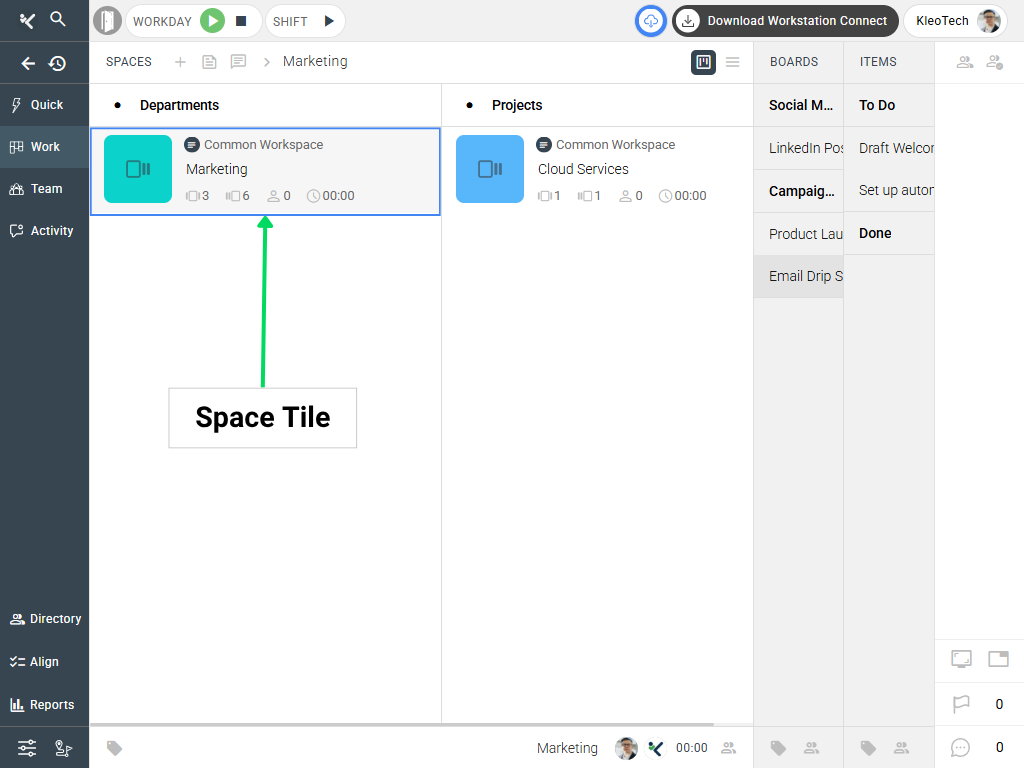
- In the Boards subpanel, each tile represents a Board inside a Board Group of a Space.
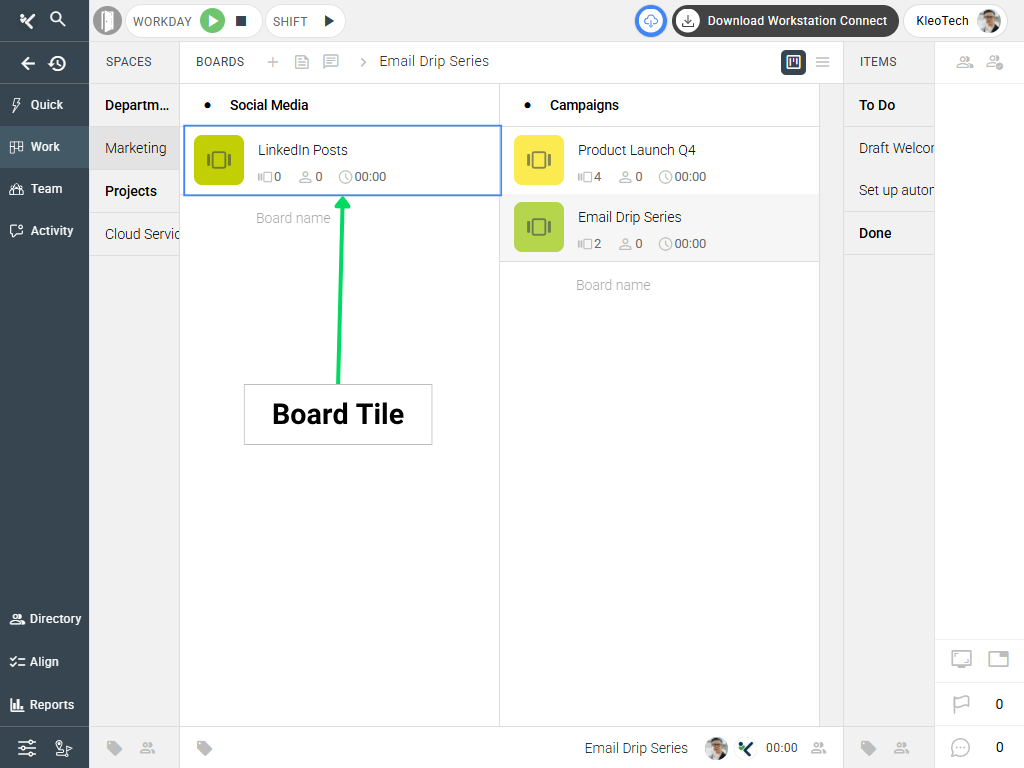
- In the Items subpanel, each tile represents an individual task or Item inside an Item Group of a Board.
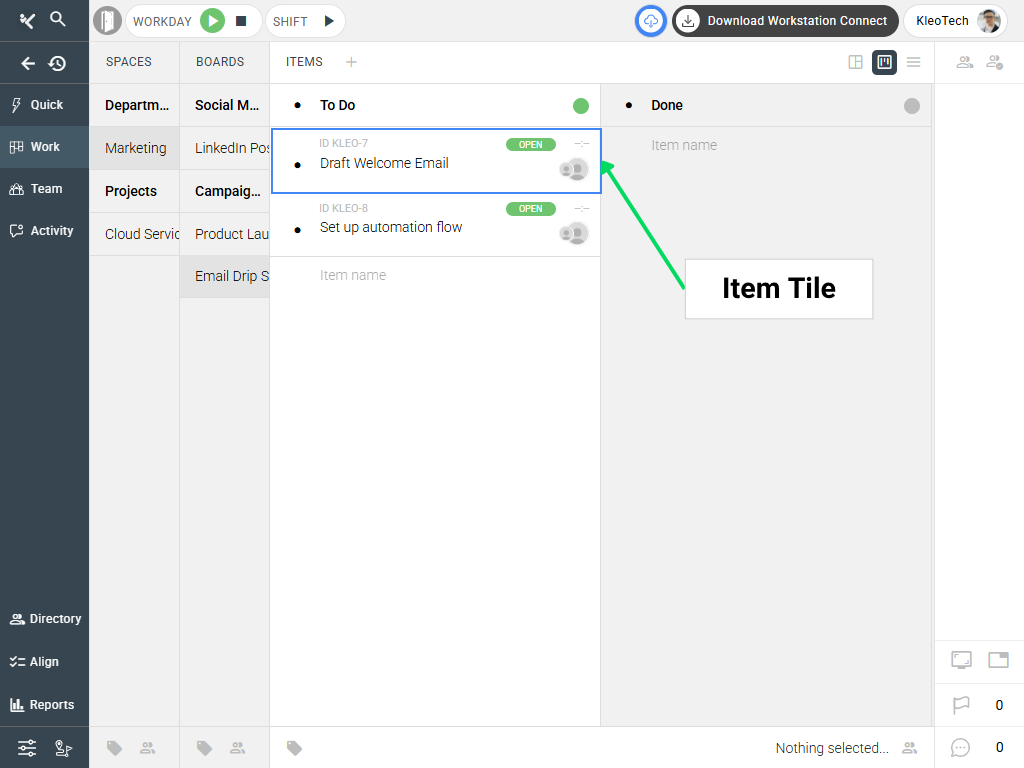
Tiles act as interactive cards that let you perform actions like chatting, editing, exporting, or closing work—all without leaving the Work Panel.
.
🎯 Why This Feature Matters #
Tile options bring the most-used actions to your fingertips, cutting down clicks and context-switching.
- They let you chat, take notes, move, and delete without leaving the panel.
- They standardize controls across Spaces, Boards, and Items, so actions feel familiar everywhere.
- They expose advanced tools (membership, exports, avatars, task controls) via one consistent menu.
Together, these benefits keep teams moving faster while staying in the flow of work.
.
👤 Who Should Read This #
If you use the Work Panel to create, manage, or complete work, this guide is for you.
- Organization Owners and Admins who structure work and manage access.
- Team Leads who coordinate projects and reporting.
- Workers who collaborate, track progress, and finish tasks.
Understanding tile options makes everyday actions quicker for every role.
.
📝 What This Guide Covers #
This article explains the options pill on tiles and the hamburger submenu for each object type.
- Spaces: all options on the pill and inside the hamburger menu.
- Boards: all options on the pill and inside the hamburger menu.
- Items: all options on the pill and inside the hamburger menu, including task-specific actions.
- A short how-to on using these options efficiently.
By the end, you’ll confidently use tile options to manage work end-to-end.
.
📄 Feature Overview #
Clicking any Space, Board, or Item tile opens an options pill with quick actions like Conversation, Notes, Copy & Move, and Delete. A hamburger icon on the pill reveals additional, context-aware options such as Membership, Edit avatar, and Export tools. While options are largely consistent across objects, Items include task controls unique to assignments and status.
.
🗂️ Spaces — Tile Options #
For Space tiles, the pill provides quick actions; the hamburger menu adds deeper controls.
- Hamburger icon: Opens more Space actions.
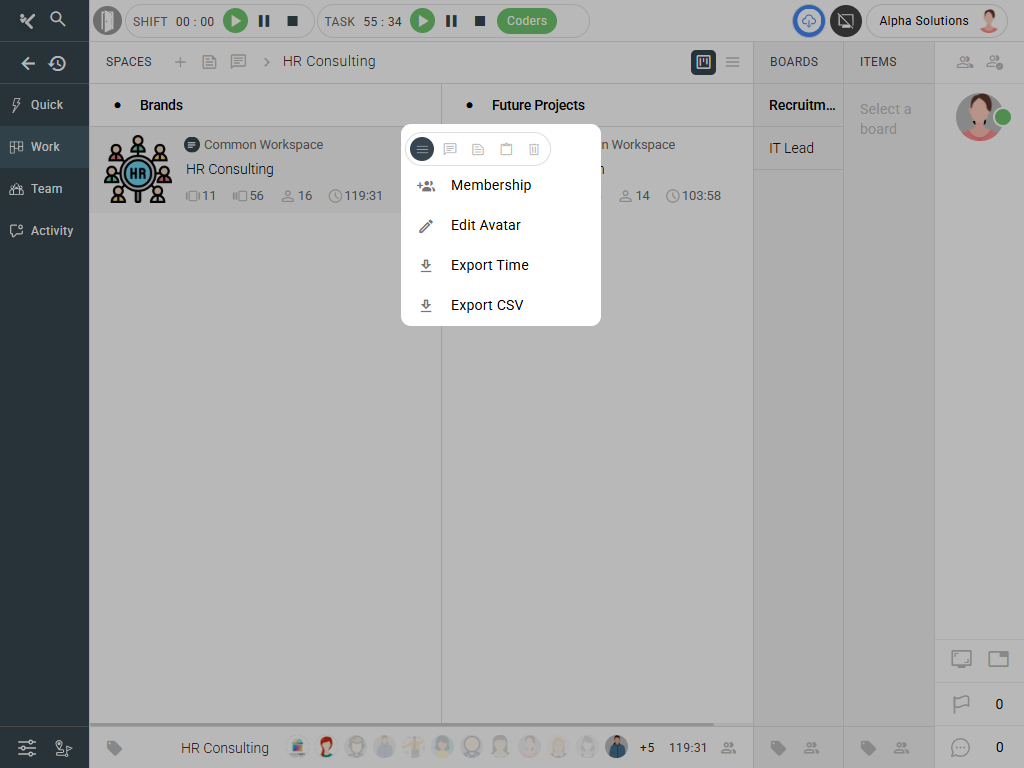
-
- Membership: Opens the worker selector in the right panel to modify Space membership.
- Edit avatar: Opens a pop-up to set or change the Space avatar.
- Export time: Exports a report of Space-level data for a predefined period.
- Export CSV: Exports a complete Space report.
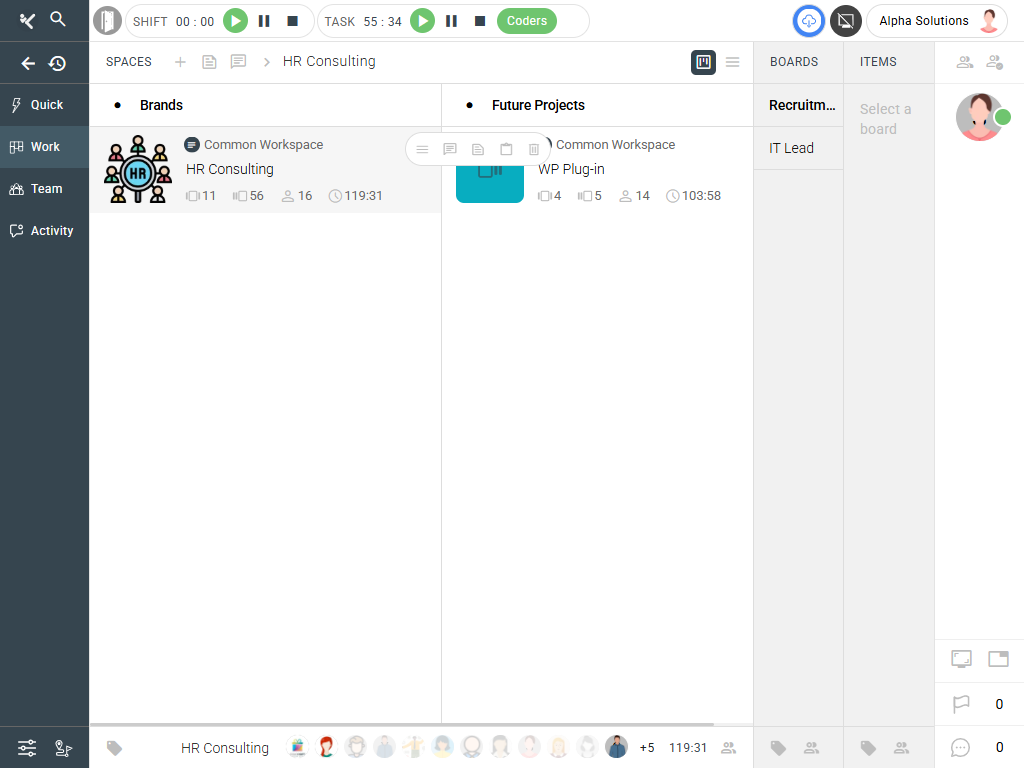
- Conversation: Opens the Space-level conversation in the right panel.
- Notes: Opens the Space’s notes.
- Copy & Move: Opens a workspace hierarchy menu so the Space can be moved.
- Delete: Deletes the Space after confirmation.
These controls let you manage structure, collaboration, and reporting at the Space level without leaving the Work Panel.
.
🗃️ Boards — Tile Options #
Board tiles mirror Space-level patterns to keep actions predictable.
- Hamburger icon: Opens more Board actions.
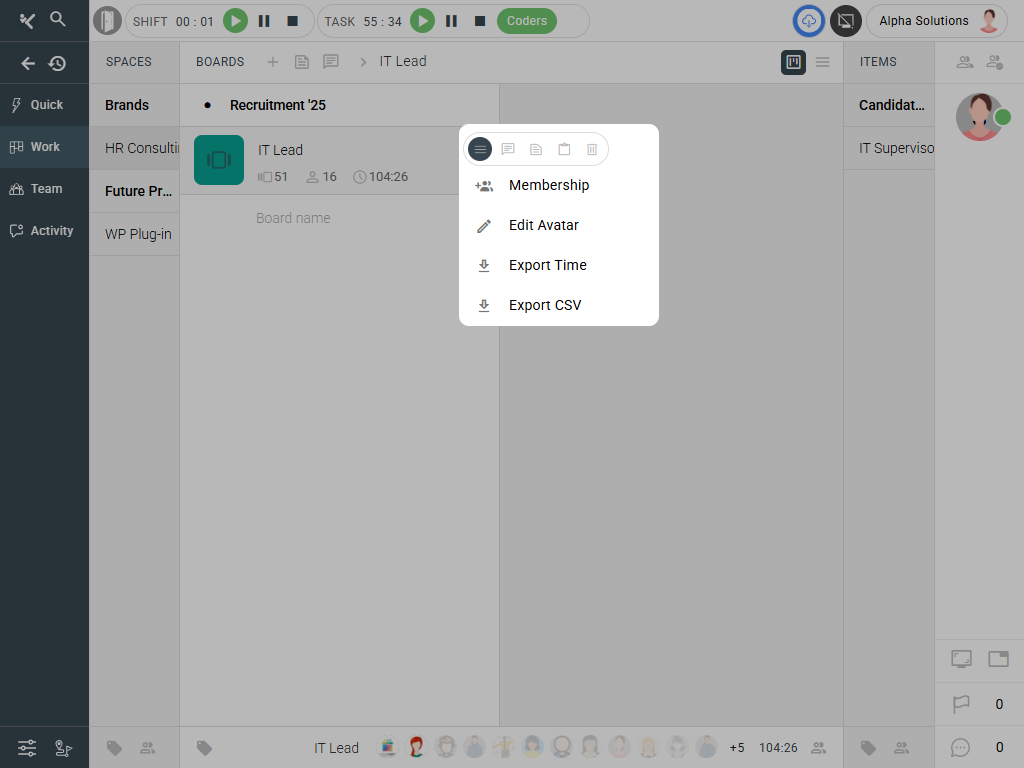
-
- Membership: Opens the worker selector in the right panel to modify Board membership.
- Edit avatar: Opens a pop-up to set or change the Board avatar.
- Export time: Exports a report of Board-level data for a predefined period.
- Export CSV: Exports a Board report.
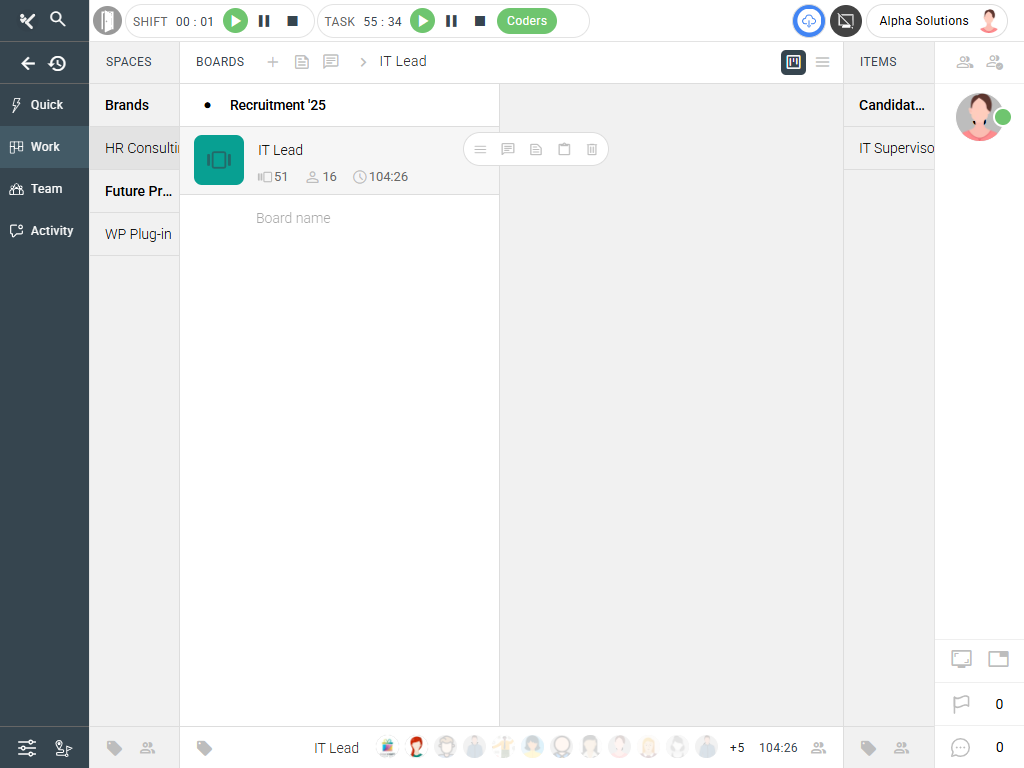
- Conversation: Opens the Board-level conversation in the right panel.
- Notes: Opens the Board’s notes.
- Copy & Move: Opens a workspace hierarchy menu so the Board can be moved.
- Delete: Deletes the Board after confirmation.
Use these options to tune team access, keep context documented, and pull data as your project evolves.
.
✅ Items — Tile Options #
Item tiles include everything you expect—and add task controls tied to assignment and status.
- Hamburger icon: Opens more Item actions.
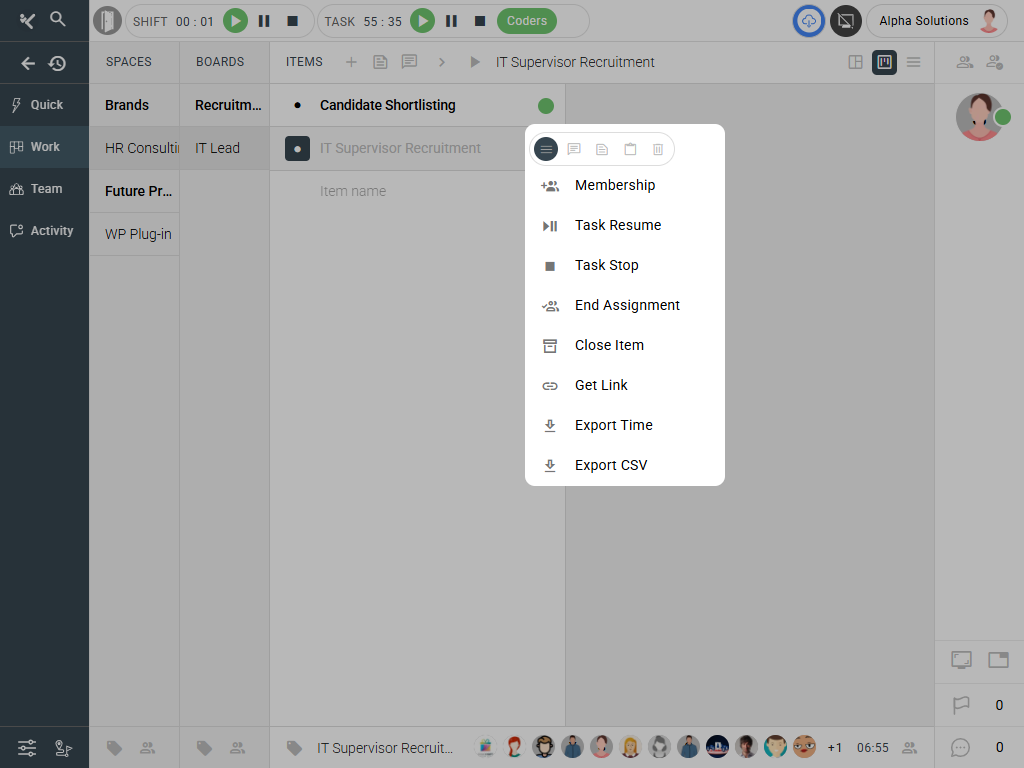
-
- Membership: Opens the worker selector in the right panel to modify Item membership.
- Task resume (assignee only): Resumes the task.
- Task start (assignee only): Pauses any current task and starts this Item’s task.
- Task stop (assignee only): Stops the task.
- End assignment (shows on assigned items): Ends the current assignment for the assignee.
- Close item (shows only on open items): Closes the Item and moves it to the closed Item Group/column.
- Get link: Copies a direct link to the Item; opening it locates the Item in Work Panel and opens its conversation on the right.
- Export time: Exports a report of Item-level time data for a predefined period.
- Export CSV: Exports an Item report.
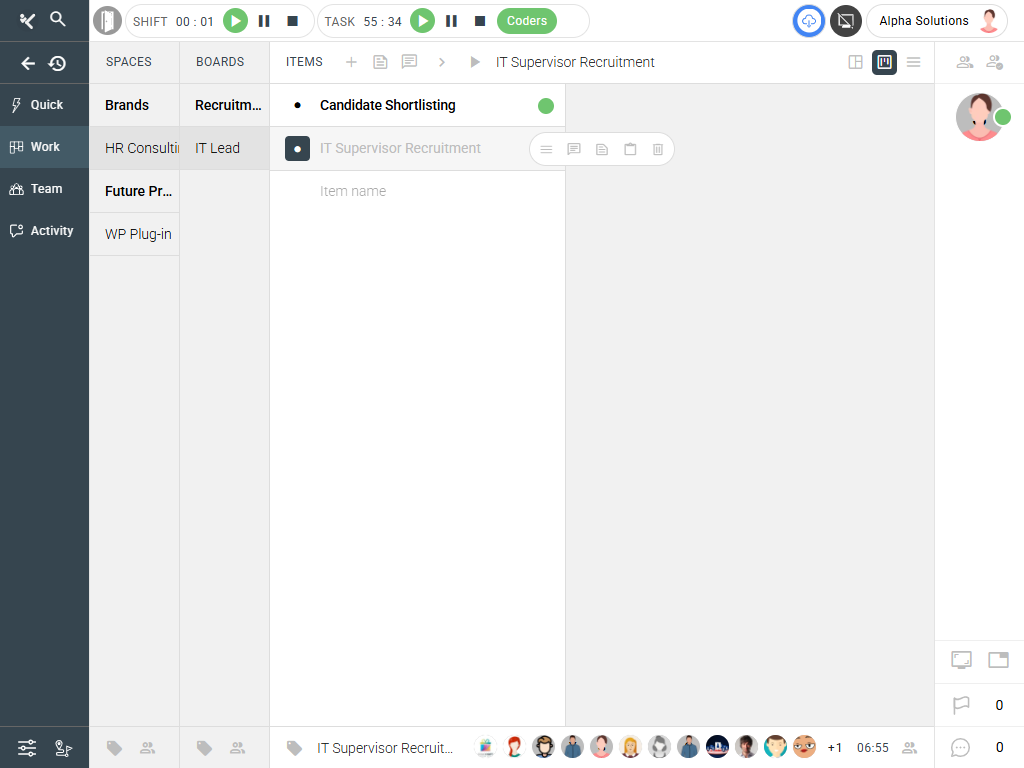
- Conversation: Opens the Item-level conversation in the right panel.
- Notes: Opens the Item’s notes.
- Copy & Move: Opens a workspace hierarchy menu so the Item can be moved.
- Delete: Deletes the Item after confirmation.
These Item controls help assignees and leads act quickly on real task flow—start, finish, close, share, and report—without losing momentum.
.
💡 Key Benefits #
Tile options streamline everyday actions across all levels.
- Speed in context: Act right on tiles—no hunting through settings or separate pages.
- Consistency: The same mental model applies from Space to Board to Item.
- Visibility & control: Membership, avatars, exports, and task controls are one click away.
This consistency reduces errors and keeps teams focused on producing outcomes.
.
🔗 Related Resources #
Here are other resources you may find useful:
- What is the Work Panel?
- What is a Space Group?
- How to create a Space Group?
- What is a Space and How to Create it?
- What is a Board Group and How to Create it?
- What is a Board and How to Create it?
- What is an Item Group and How to Create it?
- What is an Item and How to Create it?
Exploring these guides will deepen your understanding of hierarchy, collaboration, and reporting across Kaamfu.






